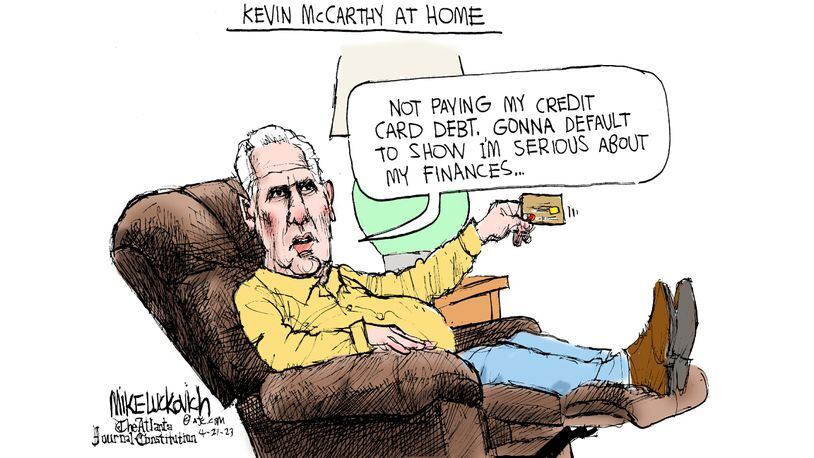Political Economy category archive
The Master Plan 0

In his commentary, the artist points out, regarding Kevin McCarthy, that
. . . it’s not up to McCarthy. He has to keep the Freedom Caucus and the fringe weirdos on board if he wants to keep his gavel. You’re not exactly negotiating from a position of power when you can’t afford to lose George Santos.
Responsible Fiscals 0
I submit that tanking the nation’s economy out of spite–they know they can’t get their way through negotiation and compromise–cannot be considered an act of fiscal responsibility, especially from the party that brags however mendaciously that it is the party of fiscal responsibility.
This New Gilded Age 0
Kathryn A. Edwards suggests that the fee hand of the market does not, indeed, fix all faults.
See her list of lingering liabilities.
The Least Bad Choice 0
Methinks my old friend Noz may be onto something.
No Place To House 0
Badtux does the math.
Aside:
I’m so old that I can remember something that might help. What was it called?
Oh, yeah.
Unscripted 0
Sam and his crew explore what’s going on with the Hollywood writers’ strike. It’s more complex that one might think.
The reasons for the strike are wrapped with how “streaming” has changed the structure of broadcast entertainment and eroded both job security and residual payments. This in turn has led to a loss of income for the writers (and, I suspect, others) who historically have relied on residuals to help protect against future income insecurity.
For more detail, visit the Youtube page for this video; there is an extensive explanation below the video.
Standoff 0
At Psychology Today Blogs, David P. Barash offers a perspective on the current impasse between those would preserve the full faith and credit of the United States of Americaand those who would destroy said full faith and credit for short-term political gain.
Aside:
Yeah, I know my wording is–er–less than dispassionate, but, really, that’s what it boils down to.
Broken by Brexit 0
Apparently, things are not going well in the United Kingdom.
Afterthought:
Anyone who pays attention to history knew that Brexit was a bad idea.
I did a “junior year abroad” at the University of Exeter (mumble) years ago (Let’s just say I saw Monty Python episodes when they were first-run).
The picture that Der Spiegel paints is not the England that I visited.
A Taxing Issue 0
Oliver Wendel Holmes, Jr., once said, “I like to pay taxes. With them, I buy civilization.” Methinks his point is well taken: roads don’t build themselves, teachers need to eat, fires don’t put themselves out, and tornadoes don’t warn you when conditions are just right for them tear down your house, just to pick a few examples out of the air.
At the Portland Press Herald, Victoria Hugo-Vidal offers some concrete examples, some from her personal experience, illustrating the validity of Holmes’s sentiment and suggests that
The Mythbuster and the Fee Hand of the Market 0
Robert Reich exposes the three myths that the ultra-wealthy use to justify their bazillions. The myths he lists are
- The first is trickle-down economics.
- The second myth is the “free market.”
- The third myth is that they’re superior human beings — rugged individuals who “did it on their own” and therefore deserve their billions.
His detailed debunking of the bunk awaits you at the link.
This New Gilded Age 0
Focusing on a proposed law in Iowa, labor leader Tom Conway warns of the consequences of the return of child labor. Here’s a bit (emphasis added):
In some cases, it even would permit young teens to work mining and construction jobs and let them use power-driven meat slicers and food choppers.
Just three years ago, a 16-year-old in Tennessee fell 11 stories to his death while working construction on a hotel roof. Another 16-year-old lost an arm that same year while cleaning a meat grinder at a Tennessee supermarket,
But these preventable tragedies mean nothing to Iowa legislators bent on helping greedy employers pad their bottom lines at kids’ expense.
We are a society in regression.
The New Gilded Age 0
Michael in Norfolk argues that today’s Republican Party is quite happy to see the return of–nay, to usher in–the New Gilded Age. Here’s a bit from his post (emphasis added):
I cannot find a way with which to take issue with his remarks, he said convolutedly.
















